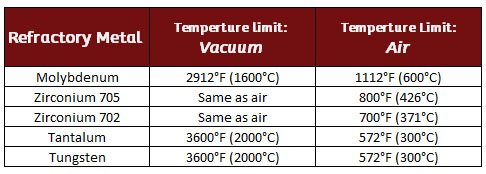 What is a refractory metal fastener?
What is a refractory metal fastener?
Molybdenum, tantalum, tungsten and zirconium are all refractory metals. (We are excluding titanium from this topic although it can be considered a refractory metal by certain definitions). All these refractory metal fasteners are characterized by their high-temperature melting points, but they also have other unique attributes such as corrosion resistance, high density or wear-resistance. Though all can handle high temperatures, refractory metals should be ONLY used in a vacuum or inert atmosphere when exceeding 500°C as they begin to react, sometimes quickly, with oxygen.

Molybdenum Screws: High Temperature Focus
Molybdenum bolts offer high temperature stability combined with low coefficient of thermal expansion – so they stay strong without expanding or loosing shape even in extreme heat over repeated cycles. Molybdenum fasteners can handle temperatures up to 2900°F/1600°C, however the must be in a vacuum or inert atmosphere when exceeding ~500°C
Tantalum: Extreme Corrosion
There is no better material for corrosion resistance. Tantalum bolts out-perform Hastelloy and zirconium fasteners in the harshest environments like high concentration boiling hydrochloric and sulfuric acid. Being an inert material it also very compatible with the human body.
Although tantalum is most known for its corrosion resistance, tantalum has a very density making 50% denser than lead and is radio-opaque. For medical devices this can be important as the tantalum fasteners easily show up on x-rays.
Tungsten: Density and Weight
Tungsten’s extreme high density of 19.3 gm/cc (70% denser than lead), as well as radiopaque attributes provide unique capabilities for weight distribution and balancing, medical devices, as well as vacuum furnace applications.
Zirconium: Excellent Corrosion Resistance
Offering excellent corrosion protection exceed even Hastelloy in hydrochloric acid but not quite as good as tantalum. While zirconium fasteners are very corrosion resistant there are some conditions where zirconium will rapidly corrode when exposed to oxidizing media.
High Temperature Strength: Vacuum vs Air
One important characteristic to note is the differing temperature limits in an oxygen-rich environment compared to a vacuum or inert environment where there is no oxygen. For example, exposing Molybdenum bolts to 1500°F in air will cause it to rapidly oxidize, where in a vacuum it will remain stable and strong.

Hi,
How can we prevent Molybdenum threads and SS 17-4 PH (vacuum Hardened H900 treatment) from galling. If Galling Happens what could be root cause.
Hello Ruckik
There are few common ways to minimize galling on threads. This could be done through a lubricant, different materials (bolt and nut being different), coatings like silver plating etc. you could learn more at the blog post (https://www.extreme-bolt.com/blog/thread-galling-what-is-it-how-to-prevent-it/); however I would be surprised if this is your problem.
It would be unusual that such different materials such as molybdenum and 17-4PH would gall. Im assuming since you are using molybdenum you are in a high temperature vacuum environment? 17-4PH has a limited temperature range so be sure your not fussing the materials together.
You could test this by seeing if the 17-4PH / Molybdenum assembly galls at room temperature. If it does then you need take some of the precautions mentioned in the galling blog post. However if this is not the case its likely a temperature related issue.
Dean
Such a great blog and I really very appreciate this content.